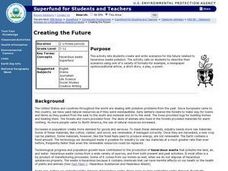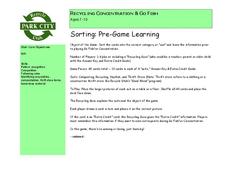Salt River Project
How Do We Clean Polluted Water?
How do we clean up oil spills and other pollutants in the water? Explore water treatment strategies with a set of environmental science experiments. Groups remove oil from water, work with wastewater treatment, and perform a water...
Curated OER
Companion to Superfund -- The Resource Conservation and Recovery Act Program
Students examine the Resource Conservation and Recovery Act. They work together to discover how their local community handles waste disposal. They complete a worksheet to end the lesson.
Curated OER
Creating the Future
Students work together to develop and write scenerios for the future of hazardous waste cleanup. They share their scenerios with the class. They complete activities as well.
Curated OER
100% Recyclable
Seventh graders research recycling activities at schools across the country using e-mail. They research the waste management and recycling program at their school and problem solve to create an environmentally sound program for the future.
Curated OER
Progressive City Planners
Students plan cities. In this environmental racism lesson, students design imaginary cities taking into consideration the amenities and environmental hazards that exist. Students discuss city planning challenges.
Curated OER
There Is No Away
Students identify how trash is disposed of. In this environmental lesson, students read and discuss the poem "Sarah Sylvia Stout" by Shel Silverstein and discuss the ways people treated the items in the poem. Students discuss how trash...
Curated OER
Eco-Graphics - Photographic Studies of Man's Impact on the Environment
Pupils, in groups, explored and photographed their own community disposal problems, focusing on the impact of waste disposal behaviors, laws, systems, and management.
Chicago Botanic Garden
Faces of Climate Change
Sometimes, the best solution to a problem can be found by walking in someone else's shoes. Here, scholars use character cards to take on the roles of people around the world. They determine how their character's life affects our...
Curated OER
Cutting Down Trees
Pupils research what kind of problems force a city or town to decide to remove trees. Students research what controversy has occurred in other cities or towns. Pupils interview those responsible for such decisions in your city or town....
Curated OER
Recycling Concentration & Go Fish
Students play a game based on concentration or memory to place recyclable items into one of 4 groups. In this recycling lesson, students work in groups of 1-4 to place cards with pictures of various items into a Composting, Recycling,...
Curated OER
What is Trash?
Learners consider what garbage is and where it ends up. In this recycling lesson, students read excerpts from Charlotte's Web and Stuart Little as they consider methods to reduce wastefulness.
Curated OER
What Can We Do About Trash in Our Community?
Fourth graders examine how to deal with the amount of trash in their community. They discover alternate ways of managing waste. They develop their own solutions to the problem.
Curated OER
LAND USE DEBATE / TOWN MEETING
Ninth graders research, analyze, and orally defend an issue related to the use of geologic resources. They defend their position in written form by composing a letter to an appropriate source.
Curated OER
Current Groundwater Contamination Research
Students research the effects of groundwater pollutants on life. They name and describe 1 environmental factor that has an effect on our drinking water. Students read the Water-Groundwater and Pollution Article. They discuss and...
Chicago Botanic Garden
Greenhouse Gas Emissions — Natural and Human Causes
What impact do humans have on greenhouse gas emissions? What are the natural causes of these gasses? Thanks to the carbon cycle, carbon dioxide eats away at the earth's atmosphere with the intensified help of humans. Young scientists...
Chicago Botanic Garden
Are You Bigfoot?
Scholars independently explore several websites to calculate their ecological footprint. Using their new found knowledge, they answer six short-answer questions and take part in a grand conversation with their peers about how our...
Chicago Botanic Garden
Greenhouse Gas Emissions – Natural and Human Causes
Part three in the series of seven has pupils discussing the different greenhouses gases, learning about the carbon cycle, and then watching a short video about the carbon cycle. Based on their knowledge, individuals complete a greenhouse...
Chicago Botanic Garden
Introducing Ecosystem Services
Purifying air and water, providing soil in which to grow crops, and moving water through its natural cycle are all services an ecosystem provides that benefit humans. Lesson four in a series lets learners explore and discuss the value of...
Chicago Botanic Garden
Personal Choices and the Planet
The last activity in the series of four has individuals determine steps they can take to reduce their carbon footprints and then analyze their schools' recycling programs. Through a sustainability audit, they identify how and where their...
Chicago Botanic Garden
Calculating Your Carbon Footprint
Unplugging from technology for one day per week will decrease your carbon footprint—are you up to the challenge? Part two in a series of three allows individuals to explore their personal carbon footprints. By first taking a quiz at home...
Chicago Botanic Garden
Personal Choices and the Planet
How big is your footprint? Activity three culminates the series by having groups complete carbon footprint audits with people in their schools and/or around the districts. Groups then gather their data, create a presentation including...
Chicago Botanic Garden
Faces of Climate Change
You know global warming is real when your squirrel feeder is full of popped corn instead of kernels! Activity two in a series of five allows learners to explore climate change through the eyes of another. After briefly analyzing their...
Chicago Botanic Garden
Calculating Your Ecological Footprint
You can lower your ecological footprint by recycling! Lesson four in this series of five has individuals, through the use of a computer, calculate their ecological footprints. Through discussions and analysis they determine how many...
Chicago Botanic Garden
Introducing Ecosystem Services
Ecosystems provide many things humans not only use but also need in order to survive. The last activity in the series of seven introduces scholars to the idea of ecosystem services, that ecosystems provide humans with many things we...

























